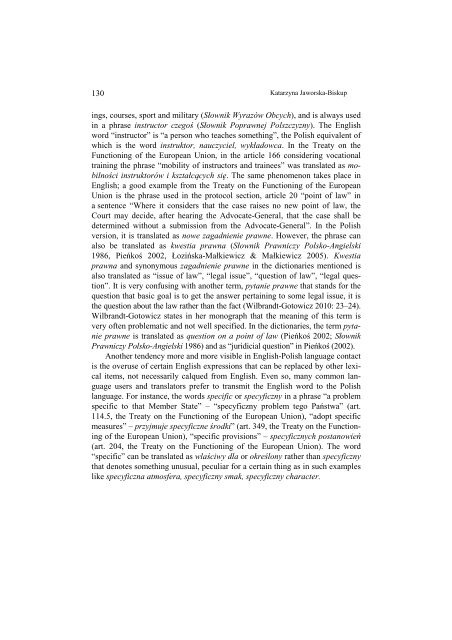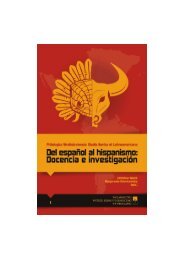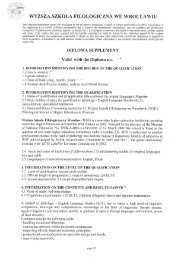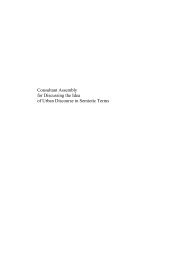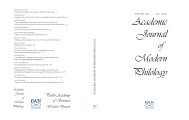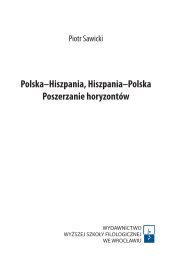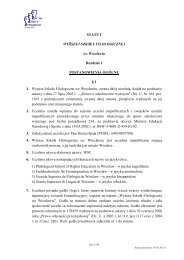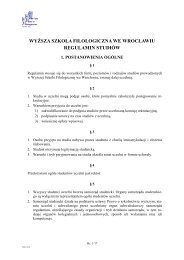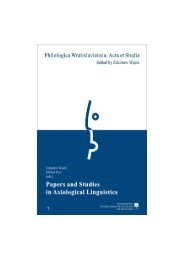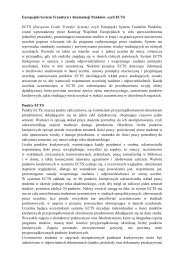s - Wyższa SzkoÅa Filologiczna we WrocÅawiu
s - Wyższa SzkoÅa Filologiczna we WrocÅawiu
s - Wyższa SzkoÅa Filologiczna we WrocÅawiu
You also want an ePaper? Increase the reach of your titles
YUMPU automatically turns print PDFs into web optimized ePapers that Google loves.
130<br />
Katarzyna Jaworska-Biskup<br />
ings, courses, sport and military (Słownik Wyrazów Obcych), and is always used<br />
in a phrase instructor czegoś (Słownik Poprawnej Polszczyzny). The English<br />
word “instructor” is “a person who teaches something”, the Polish equivalent of<br />
which is the word instruktor, nauczyciel, wykładowca. In the Treaty on the<br />
Functioning of the European Union, in the article 166 considering vocational<br />
training the phrase “mobility of instructors and trainees” was translated as mobilności<br />
instruktorów i kształcących się. The same phenomenon takes place in<br />
English; a good example from the Treaty on the Functioning of the European<br />
Union is the phrase used in the protocol section, article 20 “point of law” in<br />
a sentence “Where it considers that the case raises no new point of law, the<br />
Court may decide, after hearing the Advocate-General, that the case shall be<br />
determined without a submission from the Advocate-General”. In the Polish<br />
version, it is translated as no<strong>we</strong> zagadnienie prawne. Ho<strong>we</strong>ver, the phrase can<br />
also be translated as k<strong>we</strong>stia prawna (Słownik Prawniczy Polsko-Angielski<br />
1986, Pieńkoś 2002, Łozińska-Małkiewicz & Małkiewicz 2005). K<strong>we</strong>stia<br />
prawna and synonymous zagadnienie prawne in the dictionaries mentioned is<br />
also translated as “issue of law”, “legal issue”, “question of law”, “legal question”.<br />
It is very confusing with another term, pytanie prawne that stands for the<br />
question that basic goal is to get the ans<strong>we</strong>r pertaining to some legal issue, it is<br />
the question about the law rather than the fact (Wilbrandt-Gotowicz 2010: 23–24).<br />
Wilbrandt-Gotowicz states in her monograph that the meaning of this term is<br />
very often problematic and not <strong>we</strong>ll specified. In the dictionaries, the term pytanie<br />
prawne is translated as question on a point of law (Pieńkoś 2002; Słownik<br />
Prawniczy Polsko-Angielski 1986) and as “juridicial question” in Pieńkoś (2002).<br />
Another tendency more and more visible in English-Polish language contact<br />
is the overuse of certain English expressions that can be replaced by other lexical<br />
items, not necessarily calqued from English. Even so, many common language<br />
users and translators prefer to transmit the English word to the Polish<br />
language. For instance, the words specific or specyficzny in a phrase “a problem<br />
specific to that Member State” – “specyficzny problem tego Państwa” (art.<br />
114.5, the Treaty on the Functioning of the European Union), “adopt specific<br />
measures” – przyjmuje specyficzne środki” (art. 349, the Treaty on the Functioning<br />
of the European Union), “specific provisions” – specyficznych postanowień<br />
(art. 204, the Treaty on the Functioning of the European Union). The word<br />
“specific” can be translated as wlaściwy dla or określony rather than specyficzny<br />
that denotes something unusual, peculiar for a certain thing as in such examples<br />
like specyficzna atmosfera, specyficzny smak, specyficzny character.


